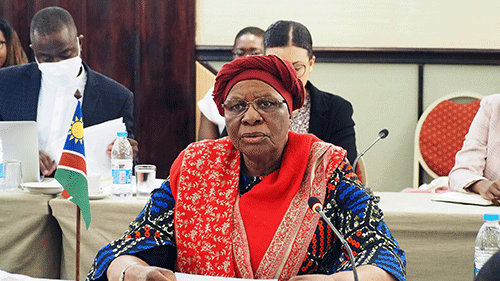International relations minister Netumbo Nandi-Ndaitwah has said the interest to strengthen cooperation in the area of green or renewable hydrogen is a welcomed development, as Namibia has one of the best conditions for the production of this energy source.
Recently, Germany’s green hydrogen envoy Rainer Baake said his country is keen on supporting Namibia’s ambitions of achieving large-scale, low-cost renewable energy development and designing models for sustainably maximising fiscal revenue.
This, he said, would boost local development in renewable energy investments and green ammonia production.
According to Baake, Namibia can expect a stable market for its new green products in Europe, mainly because the EU has set emission reduction targets that their various industries have to meet.
Addressing a Namibia-European Union political dialogue yesterday, Nandi-Ndaitwah invited European companies to work with Namibia to develop a fully functioning green hydrogen value chain in Namibia.
These include covering production, distribution, storage and local-end use of hydrogen, to establish a hub in the country for the benefit of domestic, regional and international markets, including Europe.
“Energy security is key for sustainable development, and there is a huge potential that lies ahead, as about 60% of Africa is still without access to electricity. The return on investments would, therefore, speak for itself. Namibia and the rest of Africa are open for business,” she stated.
According to her, investment in green hydrogen is an investment in clean energy that will further reduce carbon emissions.
Therefore, Namibia looks forward to enhanced cooperation with the EU, including through the non-binding agreement on sustainable raw materials and renewable hydrogen currently being negotiated by the respective teams.
EU member states remain amongst the major trading partners of Namibia, particularly in the areas of mining, fisheries, agriculture and machinery, among others.
She, therefore, invites European investors to explore ways for the further development of value chains in Namibia to add value to Namibian goods, create sustainable jobs and for a better future for all, especially women and youth.
Significantly, Nandi-Ndaitwah emphasised there is now an added advantage to manufacturing and producing goods in Namibia.
This, she says, is for those products to reach a market of about 1.3 billion duty-free, across the African continent, under the African Continental Free-Trade Area (AfCFTA).
“European companies can, therefore, expand their businesses to reach new markets in Africa tariff-free. I am informed that negotiations will commence in the near future for a specific protocol on women and youth in trade and digital trade under the AfCFTA. This initiative deserves our utmost support,” she underscored.
As the world prepares for the UN Climate Change Conference (COP27), she indicated Namibia will also seek to strengthen cooperation with the international community to mitigate the impact of climate change.
To this end, she said, a common but differentiated responsibilities approach would help to address the peculiar needs of developing countries.
Therefore, she believes, financial support to adapt to and mitigate the effects of climate change is essential if the world is going to achieve any meaningful targets.
“Recent heat waves, wildfires, floods and other extreme weather patterns are all warning signs that we must redouble our efforts to reduce greenhouse gases. Developed countries have a particularly large role to play in this regard,” she pointed out.
– anakale@nepc.com.na



